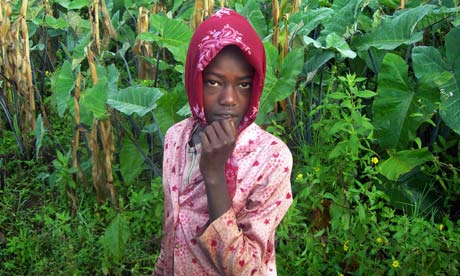
Shitaye tends her family's crop in Ethiopia during the 2008 food crisis. The malnutrition battle remains a work in progress. Photograph: Aaron Mascho/AFP/Getty Images
The millennium development goals summit last month signalled a significant milestone in the fight against malnutrition. For the first time, world leaders stood on a shared platform and made clear that, from this point on, malnutrition would no longer be a neglected issue.
A child dies every six seconds from hunger, a shocking statistic. Tackling hunger must be among the most pressing priorities for all of us.
Recent news headlines carried alarming stories of another impending food price spike. While it's unlikely in the short term that we will see prices skyrocket as they did in 2008, the food price crisis in that year increased the number of people suffering from hunger by 150 million, from an already unacceptable 800 million. We must be on our guard and not allow a repetition.
And even without another food price crisis, ongoing domestic food price shocks caused by weather variability and poor harvests have a devastating impact. High food prices hit the poorest hardest. They spend the majority of their income on food and, in simple terms, higher prices mean less food, or less nutritious food.
How big a problem is this? The honest answer is that we don't know. When it comes to food, malnutrition continues to be a neglected issue. National malnutrition statistics are only gathered every two to five years, so we have no way to pick up the effects of massive global shocks in time to trigger and inform a response. Nearly three years on, we still don't know whether the 2008 crisis actually did cause an increase in the level of malnutrition.
So we struggle to get meaningful information on the impact on nutrition. And it is equally difficult to measure what progress we're making in tackling it.
In its recent flagship report, The State of Food Insecurity, the UN's Food and Agriculture Organisation uses data provided by governments on the national availability of food. This gives an idea of overall trends but it tells us very little about who is hungry, where they live, and whether people are able to get the food they need to protect themselves and their children from malnutrition. These limitations of current data and statistical approaches were discussed at the committee on world food security taking place in Rome this week.
In Nigeria, for example, more than 10 million children are physically and intellectually stunted as a result of malnutrition - the third highest number in the world. Yet if we only look at how much food is available at the national level, then the country could be said to have met its MDG target on hunger.
So we need better information on malnutrition if we are effectively to tackle the challenge. But we also need to be smarter in our response. We can assume that food price rises hit the poorest hardest, and much of the evidence suggests this is the case. And we can warn against knee-jerk reactions such as export bans, which will limit the amount of food in circulation and therefore tend to exacerbate a spike in prices.
But the reality is that malnutrition is as much about whether people can afford, and get hold of, a healthy diet as it is about ensuring tonnages of staple food production.
Tomorrow is World Food Day, and this government is completely committed to improving the lot of the world's poorest people. That's why, even in these difficult economic times, we've ring-fenced the development budget and reaffirmed our commitment to reaching the target of 0.7% of gross national income spent in aid from 2013.
The Department for International Development is currently reviewing how it spends its budget. We will be looking to achieve the maximum impact with our aid. In the fight against malnutrition this will involve a more intelligent response. If we are serious about fighting malnutrition we must, with others, ensure that our work is directed as much towards increasing people's access to food and essential nutrients as it is to increasing its supply.
http://www.guardian.co.uk/global-development/poverty-matters/2010/oct/15/malnutrition-intelligent-approach-andrew-mitchell











No comments:
Post a Comment